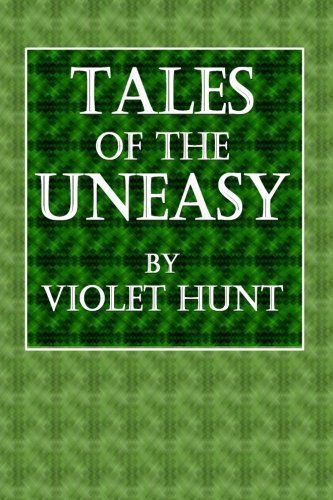
Tales of the Uneasy
THE hard, pungent, scintillating cleverness that marked Miss Hunt's earlier method has been retained through the immeasurable advance of her later work. And this diamond sparkle, taken into conjunction with the high seriousness and insistent pathos that found so fine an expression in White Rose of Weary Leaf, lifts the cleverness at times into something not unlike genius. The old eternal Weltschmerz known to Solomon, is known, we should imagine, most abundantly to Miss Hunt. But in her case it only reaches the reader after being absorbed through an intensely modern intelligence. There is nothing defiant, by the way, about Miss Hunt's modernity: her metaphors and her epigrams, though the newest of the new, come to her naturally -- because she happens to have that sort of up-todate mind, and to think in that sort of up-to-date language, not to say slang. All this applies pre-eminently to Tales of the Uneasy, which have, in addition, a haunting value of their own. The title, by the way, is singularly felicitous. "Uneasy" is exactly the right word to apply both to the experiences they relate and the effect they have on the reader. They are not exactly ghost stories -- or at least they bear very little relation to the old turnip-head ghost of Christmas fiction, but they are things to make the flesh creep nevertheless. The mise en scene is more often than not normal, even commonplace. Then a touch of uneasiness troubles the atmosphere, deepening by almost imperceptible degrees to actual horror. Once begun, no story of them all can be left unread, and for our sins, in the case, for instance, of that most piteous and most moving tale of helpless infancy, "The Barometer," cannot be forgotten. All the plots -- save those in which the more realistic details are candidly taken from certain newspaper reports, are fresh and unhackneyed, if such words can be applied to things so bitter-sweet, ' so smarting, so dipped in the knowledge of both worlds as these. "The Telegram" is the title of the first one. It tells how a flirt, having made use of a man's devotion for many years, at length decides to marry him, with the idea that his companionship will be preferable to that of the inevitable paid companion. But, unfortunately, she invites to dinner, and makes her proposal to, a man whom an after-comparison of dates proves to have been a corpse at the time. There is nothing to suggest the supernatural during the course of that formal t£te-a-t£te dinner-party, but the reader feels its uncanniness in his bones. Equally creepy is "The Prayer," where, in answer to a wife's passionate peremptory prayer to the Almighty, her husband is given back to her from the dead. He was an uncomfortable yoke-fellow, and the sense not only of death and the grave but of a thousand sepulchres seems to have got into that particular story. But above and beyond all the rest is "The Operation," which is one of the weirdest and most powerful short stories we ever remember to have read. We will not disclose the plot, since its force and poignancy all lie in the telling. But it should become in its way a little classic. --The Outlook, Vol.27